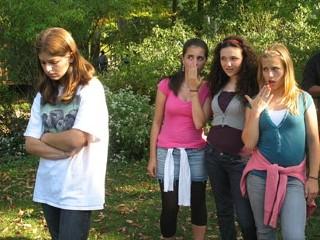As a teenage girl, I’m constantly haunted by social and cultural standards that dictate harmful and confusing messages, like that a low weight is correlated with beauty, that you need to be thin to be desirable, and that young women not only individually need to be thin but should attack those who don’t live up to these standards.
I started to experience issues related to weight and beauty at around the age of 9-10. Most people point to the media as the culprit for these messages and while it certainly plays a part, I actually don’t remember watching shows that portrayed only (or, at least, mainly) thin actresses the way they seem to now. In fact, I remember these shows featuring actresses who would be considered “normal” (which would now probably be considered “fat”).
No, my issues with weight came from a “friend” whom I had known since we were 7. He enjoyed constantly reminding me about how ugly I was and told me he “cried for three days” after I told him I liked him (a direct quote – you don’t forget a comment like that). A few years later, I started to gain some weight and he, predictably, started teasing me about it. I began to fear people’s disapproval. I went from being a skinny kid to an adolescent who (as many growing girls do) gained weight. I perceived that weight gain as a much bigger deal than it was because of this kid’s hell-bent desire to tease me about it.
I finally managed to get as far away from this kid as I could, but years of teasing left their mark. I started to starve myself. I lost enough weight that he considered me “normal” and stopped saying I was fat. This motivated me to keep losing weight and to this day I still have severe issues with my weight. It’s gotten to the point where I feel on the verge to tears whenever I see a picture of a thin model and severely monitor my diet.
But this one friend wasn’t the only one to impact my body image: my current “friends,” though more subtle, are hardly any better. They tease me about my weight, constantly complain about their own insecurities and make mean comments about each others’ weight behind each others backs. I remember the first time one of these “friends” called another friend — who I consider beautiful — fat. I wondered how they must see me, thinking “If she’s fat, I must be obese.” Only a few true friends know about the extent of my insecurities and, thankfully, they always try to be supportive about it.
Feminism has helped me recover by encouraging me to love myself, but at the same time it has also added a new element to my insecurity. I live inside the double standard of trying to encourage people to love themselves and highly respecting those who are brave enough to challenge society’s beauty ideals, but on the other I can’t help but hold myself to this same horrible standard of beauty, and find it incredibly difficult to hear other young women call each other fat and not worry about my own weight. Deep inside I feel the need to love myself and know there’s nothing wrong with me, but on a day-to-day basis I feel a strong compulsion to be that two-dimensional ideal I’m indoctrinated with and which all my friends worship. It’s this double standard that makes my issues with self-loathing and starvation diets even harder to deal with.
I think this is common among young girls. Many of us really do find the thin-ideal ridiculous and unnecessary but at the same time the messages imparted by the media and society — and perhaps more importantly, the messages we send each other every day — make us live and feel in opposition to these same beliefs. When feminism or even just common sense again remind us how ridiculous this is, we just feel even worse. We’re caught in our own double standard.
I recently visited the family of my mom’s friend. I began to befriend the youngest daughter of the family, a joyful seven-year-old girl. One day she said, “I need to eat less, I’m getting really fat.” I was completely shocked by this and even remembering it I just feel so disgusted. How did we get to the point where even a seven-year-old girl has a distorted view of her body? How many other little girls feel this way and say things like this to themselves every day? When will they start saying the same things to their friends, continuing this cycle? I fear for my own loved ones, for toddlers who one day will grow up and realize that the bodies of the girls on T.V. are purposely designed, that the price they must pay to look like them might be very high. I can only hope that they treat themselves, and equally as importantly, others, with more kindness than my friends and I have.


